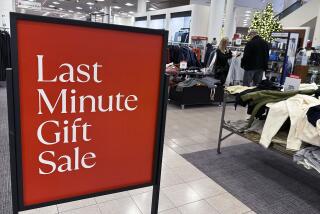Attention Shoppers: It’s All Negotiable
- Share via
In Kmart recently, as I stood contemplating the purchase of a suitcase, an employee stopped stocking the shelves nearby and ask if she could help. This was shocking enough. But then, when I confessed to indecision, she offered me 20% off. She scrawled something on a blank scrap of paper, which I dubiously took to the checkout with my selection and, lo and behold, the cashier knocked almost $4 off the price. All without a blue light to be seen.
My first thought was: What a deal! My second thought was: Have I been overpaying all along?
The day after Thanksgiving marks the start of the American holy season--Shopping. Like Ramadan, Shopping need not interfere with a war and vice versa. In fact, the president has said it’s our patriotic duty to keep shopping. We cannot let terrorism change our way of life.
But shopping is getting more complicated. The historian Daniel Boorstin has written about how the industrial and commercial revolution of the 19th century brought standardized goods--such as clothes premade in various sizes rather than made to order--at standardized prices. Our current industrial and commercial revolution is reversing that. Computers are allowing clothiers from Levi Strauss to Brooks Bros. to offer pants personalized for your rear end. On the Internet, you can fine-tune your appetites endlessly, and you rarely have to settle for cerise because taupe is out of stock.
But thanks to computers, you also can find yourself sitting on an airplane next to someone who paid one-fifth of what you paid for an identical seat. The airlines, in fact, may have started this whole trend a couple of decades ago with the development of software that can change prices and restrictions minute by minute.
The tragedy of charging everyone the same price, from the seller’s point of view, is that the price is set by the most reluctant buyer.
Everyone has a price he or she is willing to pay for, say, a Harry Potter Junior Anthrax Detection Kit. If the price is $39.95, anyone whose price is less doesn’t get one. But anyone whose price is more, even much more, pays just $39.95. The challenge is to sort out the folks willing to pay $49.95 or $69.95 and prevent them from getting it for less. The usual solution: Add hassle.
Harry might, for example, decide to charge $49.95 with a $10 mail-in coupon. Coupons used to be found mostly at the supermarket, for amounts like 7 cents off at the cash register. Now you see them for $100 off a $2,000 computer, except that you have to mail them in with copies of the receipt, a code number stamped on whatever bit of packaging you’re most likely to have thrown away and your grandmother’s citizenship papers--and then wait 60 to 90 days for a check. Why not just knock $100 off the price? Because some people won’t bother with all the complications. In effect, these folks pay $2,000 while others pay $1,900.
The airlines need to play an especially ruthless game of chicken with their customers because a seat on Flight 3206 from Miami to Chicago, unlike a washing machine, becomes worthless if it isn’t sold in time. So as every flight gets nearer, the airline is willing to accept less and less at the very time some of its passengers are willing to pay more and more. The infuriating rules about Saturday night stay-overs and so on are a crude alternative to administering truth serum and asking, “So how much are you really willing to pay?”
Cars and houses are the only purchases most Americans are used to haggling over. And most hate it. Worse than just a hassle, bargaining is fraught with anxiety about being suckered. Now along comes the most successful Internet e-commerce site, EBay, to reintroduce bidding and bargaining. EBay is not about finding a new home for that old lamp in the attic; it’s a new channel for commerce in which each buyer is induced to reveal and pay a custom-made price.
Is the disappearance of standard prices a bad thing? Not necessarily. Free-market theory assumes that all players have “perfect information.” Information technology is bringing reality closer to this implausible theory and thus making the economy more efficient. Varying prices may average out to be lower, and poorer people may benefit disproportionately because the opportunity to endure hassles for a bargain is a better deal if you’re poor than if you’re rich.
On the downside, artificial hassles are a strange thing for a healthy economy to be churning out. As if we didn’t have enough real ones.
More to Read
Inside the business of entertainment
The Wide Shot brings you news, analysis and insights on everything from streaming wars to production — and what it all means for the future.
You may occasionally receive promotional content from the Los Angeles Times.










